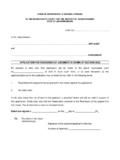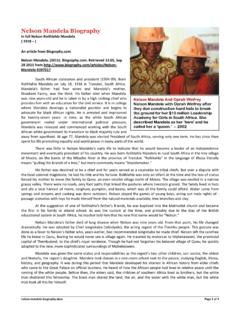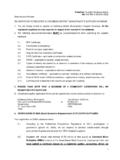Transcription of IN THE LABOUR COURT OF SOUTH AFRICA HELD IN …
1 1IN THE LABOUR COURT OF SOUTH AFRICA held IN JOHANNESBURG REPORTABLE CASE NO: J1092/08 In the matter between: GOSISEPHUTHABATHO GUSTUV LEKABE APPLICANT AND THE MINISTER DEPARTMENT OF JUSTICE AND CONSTITUTIONAL DEVELOPMENT RESPONDENT JUDGMENT MOLAHLEHI J Introduction [1] This is an application in terms of which the Applicant prays for an order on the following terms: 1.. 2. Declaring that the period of suspension of the Applicant from his duties by the Respondent expired on or about the 24 May 2008. 3. Declaring that the provisions of clause (2)(c) of the Senior Management Service Handbook relating to the holding of a disciplinary hearing before the expiry of 60 days from the date of the Applicant's suspension were peremptory.
2 24. Declaring that the right of the Respondent to hold a disciplinary hearing in terms of clause (2) of the SMS Handbook terminated with the expiry of the 60 days mentioned in paragraph 3 above. 5. Interdicting the Respondent from proceeding with the disciplinary action against the Applicant on the basis of the charges which are hereto attached and marked "A". 6. Declaring that the suspension of the Applicant from his employment as the State Attorney for Johannesburg was no longer valid. 7. Ordering the Respondent to permit the Applicant to resume his duties as the State Attorney for Johannesburg within 5 days from the date of this order. [2] In essence the Applicant s case is that his suspension terminated when the period laid down in clause (2) of Chapter 7 of the Senior Management Service Handbook ("the SMS Handbook") expired.
3 He further contends that the Respondent's prerogative to subject him to a disciplinary hearing also terminated with the expiry of the aforesaid period, and that he was entitled to resume his duties as the State Attorney in light of the expiring of the suspension period. 3 Background facts [3] The Applicant received the letter suspending him from his duties from Mr Menzi Simelane, the Director-General for the Department of Justice and Constitutional Development on 25th March 2008. The reason for the suspension was: Serious allegations of, inter alia, corruption and sexual harassment have been made against yourself. The allegations, amongst other, relate to soliciting and / or accepting bribes or other improper inducement from service providers.
4 It has also come to the Department's attention that you have been found guilty by the Law Society of the Northern Provinces for serious professional misconduct and a decision has been made to request you to show cause why your name should not be struck off the roll of practicing attorneys. In view of the seriousness of the allegations against you, and the fact that your presence within the office may jeopardize any investigation into the allegations, the Department has decided to suspend you in terms of clause (2)(a) of Chapter 7 of the Senior Management Services Handbook. You are hereby given the opportunity in terms of the rules of Administrative Justice to comment on the abovementioned.
5 Your written representations or a written indication that you do not wish to submit any, must please be handed to Adv L Vilakazi, Chief Litigation Officer 4within 48 hours of receipt hereof, where after your suspension will be reconsidered. Should you fail to reply within the stipulated period it will be deemed that you do not wish to submit representations. [4] After some communication through correspondence between the parties attorneys, the Applicant was served with a letter on the 12th June 2008, notifying him to attend a disciplinary hearing on the 20th June 2008. The Applicant contends that in terms of clause (2) of Chapter 7 of the Code he should have been charged with misconduct within 60 (sixty) days of his suspension, failure to do so amounted to a waiver of the right to discipline him by the Respondent.
6 [5] Thus the issue for determination in this matter concerns the interpretation of clause (2) of the SMS Handbook and specifically whether: the provisions of clause (2) are peremptory. the suspension has become unlawful as a result of the expiring of the 60 (sixty) days. an employer has the right to continue with the disciplinary hearing after the 60 (sixty) days has lapsed. [6] For the purposes of this judgment I do not deem it necessary to go into details of the charges proffered against the Applicant. [7] In his submission that the Respondent was no longer entitled to proceed with the disciplinary hearing because of the lapse of 60 (sixty) days since his suspension, the Applicant relied on the decisions, Minister of LABOUR v General Public 5 Service Sectoral Bargaining Council & Others [2006] 27 ILJ 2650 (LC) par 12 & 13 and Lovejoy Mlambo & Another v Head of Department: North West Department of Agriculture, Conservation and Environment & Another unreported case number CA1202/06.
7 [8] In the Lovejoy Malambo the Buphutatswana Provincial Division in an urgent application concerning the suspension of the employees over a period of 368 (three hundred and sixty eight) days, held per Landman J that: [22] The applicants have not waived their right to rely on clause (2)(c) of the Handbook. They accordingly have the right not to be subjected to a disciplinary The COURT went further and prohibited the employer from taking disciplinary action against the two employees. The suspension which had exceeded the 60 (sixty) days in terms of clause was declared invalid. [9] The case of the Minister of LABOUR (supra) is distinguishable from the present case in that in that case the COURT was dealing with the unfair LABOUR practice.
8 The unfair LABOUR practice issue which the arbitrator had to deal with before the matter came before this COURT on review concerned the provisions of clause (c) of Resolution 1 of 2003 of the Public Service Coordinating Bargaining Council (the PSCBC) which reads effectively the same way as clause (2) of the SMS Handbook. Clause (c) reads as follows: If an employee is suspended or transferred as a precautionary measure, the employer must hold a disciplinary hearing within a month or 60 days, 6depending on the complexity of the matter and the length of the investigation. The chair of the hearing must then decide on any further postponement. [10] In that case, the Minister of LABOUR , the COURT confirmed on review the finding of the arbitrator that employer in charging the employee after the expiry of the 60 (sixty) days committed an unfair LABOUR practice.
9 [11] In LLoyed v CCMA and Another (2005) 26 ILJ 1039 (E), the COURT found that the time frame for bringing disciplinary hearing against the employee as set out clause and of Resolution 1 of 2001 to be peremptory and binding. In that case the delay in instituting the disciplinary hearing against the employee for the first offence was 32 (thirty two) months after the occurrence of the offence, a delay of 22 (twenty two) months after the second offence and a delay of 18 (eighteen) months after the investigation. The COURT further fond that on the face of it the delay was excessive and in the absence of good cause unreasonable. [12] In my view the above approach is incorrect. I specifically, with due respect do not agree with the decision in Lovejoy Malambo and believe that the decision was made in error.
10 In dealing with the broader principle of the consequences of failure by an employer to comply with the provisions of a disciplinary code, this COURT in National Union Of Mineworkers v Foskor unreported case number JR 888/05, held that the correct approach to adopt was that enunciated in Highveld District Council v CCMA and Other (2002) 12 BLLR 1158 (LAC). See also 7 Khula Enterprise Finance Limited v Madinane and others (2004) 4 BLLR 366 (LC) and SA Tourism Board v CCMA and Others (2004) 3 BLLR 272 (LC). [13] In Highveld District Council, the LABOUR Appeal COURT held that: Where the parties to a collective agreement or an employment contract agree to a procedure to be followed in disciplinary proceedings, the fact of their agreement will go a long way towards proving that the procedure is fair as contemplated in Section 188 (1)(b) of the Act.


















